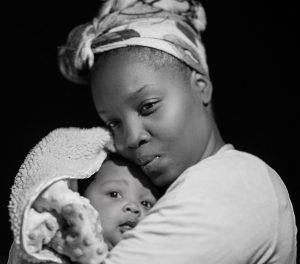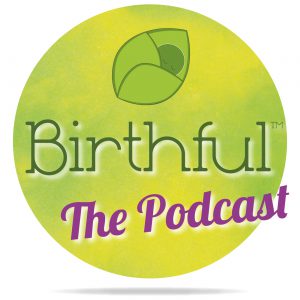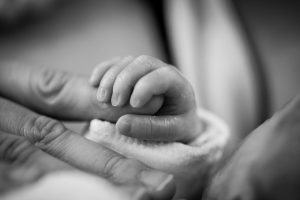
Why this podcast?
Birthful is featuring here for the fourth time so I won’t go too much into the ins and outs but with one hundred and twenty episodes you will find a lot of information to –
“Inform your intuition”
Birthful is hosted by the mighty Adriana Lozada, a doula, author and postpartum educator, whose enthusiasm for her work bubbles over in each and every episode.
Interviews with pregnancy, birth, postpartum, breastfeeding and parenting professionals, along with Adriana’s own experience, make for a really informative, well-rounded podcast.
If you’d like to check out the other three posts featuring Birthful you can find them here –
Unforgettable Doula Moments
Doulas &
Family-Centred Cesareans

How does it look?
Episodes are released each week and tend to be around an hour. Topics that have been covered include VBAC, breastfeeding, baby wearing, safer bed-sharing, vaginal rehab, your pregnancy microbiome, induction, lots of birth stories, going back to work, elimination communication and surrogacy.
Why this episode?
When you think of babies coming into the world you don’t want to think of trauma. It doesn’t fit our picture of how birth should be. It’s uncomfortable.
But it’s important to talk about it because birth trauma is real.
The title, Birth Trauma Myths, made me curious as I had never associated the word myth with birth trauma.
This episode explores birth trauma in some detail, what it is, some myths surrounding it, what it looks like and how you can do your best to avoid it.
Who should listen to this episode?
Anyone who is pregnant and wants to either try and avoid repeating birth trauma or to avoid it in the first place. And, really, anyone who isn’t familiar with birth trauma at all.

The episode
This episode features Bianca Sprague and Natasha Marchand from Bebo Mia, an online provider of skills and business training for aspiring birth workers and parenting professionals.
First of all, what is birth trauma?
Well, Bianca and Natasha define it as something that occurs during the birth that is triggering for the mother.
As many as nine percent of new mothers experience PTSD (Post Traumatic Stress Disorder) after their birth.*
What are some signs of birth trauma?
Some signs that you or a loved one could be suffering from birth trauma include:
– Intrusive thoughts or flashbacks to the birth
– Detachment from anything linked to the trauma, including their baby
– Being extremely anxious
What are some of the myths surrounding birth trauma?
#1 – Birth trauma is most likely to happen to women who have had past trauma
For example rape, sexual assault or incest.
Birth trauma can happen to anyone and what is traumatic for one person is not necessarily traumatic for someone else.
#2 – It’s easy to see which births will result in trauma
As I mentioned above, trauma is deeply personal and can come from something that to another’s eyes, seems insignificant.
For one person trauma could stem from being bullied into decisions by their care provider.
For someone else, it could be not having access to an epidural when it had been their plan to have one.
I like that Bianca and Natasha underline that during labour and birth you are most likely tired, in a heightened emotional state and, often, vulnerable.
Events can affect you in a way that they may not normally.
#3 – Trauma only results from a birth with major complications
Trauma does not have to stem from something as heartbreaking as the loss of a baby or as dramatic as an emergency cesarean.
No big, dramatic event is necessary.

#4 – In time, you’ll just forget your trauma
Give it a year or two and you won’t remember it. Or, once you have another baby that memory will replace the traumatic one and you’ll be fine.
Unfortunately, that’s not the way it works.
Acknowledging your trauma rather than minimising or denying it and finding the support you need to work through it before you birth again, is incredibly important.
#5 – All that matters is a healthy baby
I actually wrote a whole post on this and if you’d like to read it, you can find it here.
The myth that if you and your baby are both fine then you should simply be grateful and move on is a huge one.
Of course a healthy mum and baby are incredibly important but other things matter too.
Feeling that your birth was a positive experience, that you were heard and that you were involved in the decision making all matter. A lot.
#6 – Hiring a doula will prevent trauma
As much as I, as a doula, would love this to be true, unfortunately, it just isn’t.
A doula can support you and be that calm, positive presence in the room but they cannot guarantee a specific outcome for your birth or how you will feel about your birth afterwards.

Risk factors for birth trauma
Birth trauma, as we said, can happen to anyone but are there some risk factors to be aware of?
Yes, and they include –
– Women who have experienced past trauma
– Those who have birthed premature babies
– Women who have experienced death or some kind of injury during a previous birth
– Those with fears surrounding their birth
– Feeling bullied into decisions
– Feeling you are not being heard during your birth and,
– Unplanned interventions
How can I prevent trauma?
There’s no sure fire way to guarantee you will not experience trauma but here are some things that can help –
#1 – Have a supportive birth team
A doula, your partner, a close friend, all three maybe. Constant, positive support can go a long way towards helping avoid trauma.
#2 – Work with supportive care providers
Your midwife or doctor should be someone you can trust and who is on your side. You should be able to be open with them and know they want what is best for you.
#3 – Informed consent
This is HUGE. Knowing what your options are and the benefits and risks that accompany each one means that you can be actively involved in the decision making rather than having your birth happen TO you.
So, so, so important.
#4 – Creating a safe birth environment
This will be different for everyone but dimming the lights (or putting them on), bringing a pillow that smells like home or playing your own music can all help you feel more at home.
For more ideas on creating a positive birth environment you can check out this blog post.

To wrap up
This episode is pretty extensive and there’s a lot that is discussed that I have not gone into here. It really is a fascinating one to listen to and I encourage you to check it out in full.
I would be very interested to hear from anyone who feels able to share their traumatic birth experiences. Did you feel that others validated your feelings or instead tried to gloss over them and point out the silver linings? How were you affected?
If anyone has experienced trauma in birth and it is still unresolved or not yet validated, I encourage you to talk to someone who can support you in acknowledging and addressing your feelings.
Other episodes on this topic
The Trauma Therapist Project – Birth Injury, Birth Trauma & Sexual Healing
Mom and Mind – Coping with Perinatal PTSD (episode 35)
* I have to assume that this statistic is based on PTSD rates after birth in the USA.
Emily Wills is a doula based in Stockholm. She believes that birth can be a beautiful and empowering experience and started this blog as a way of sharing some really great podcasts. She is also a mother of three and an enthusiastic runner.
